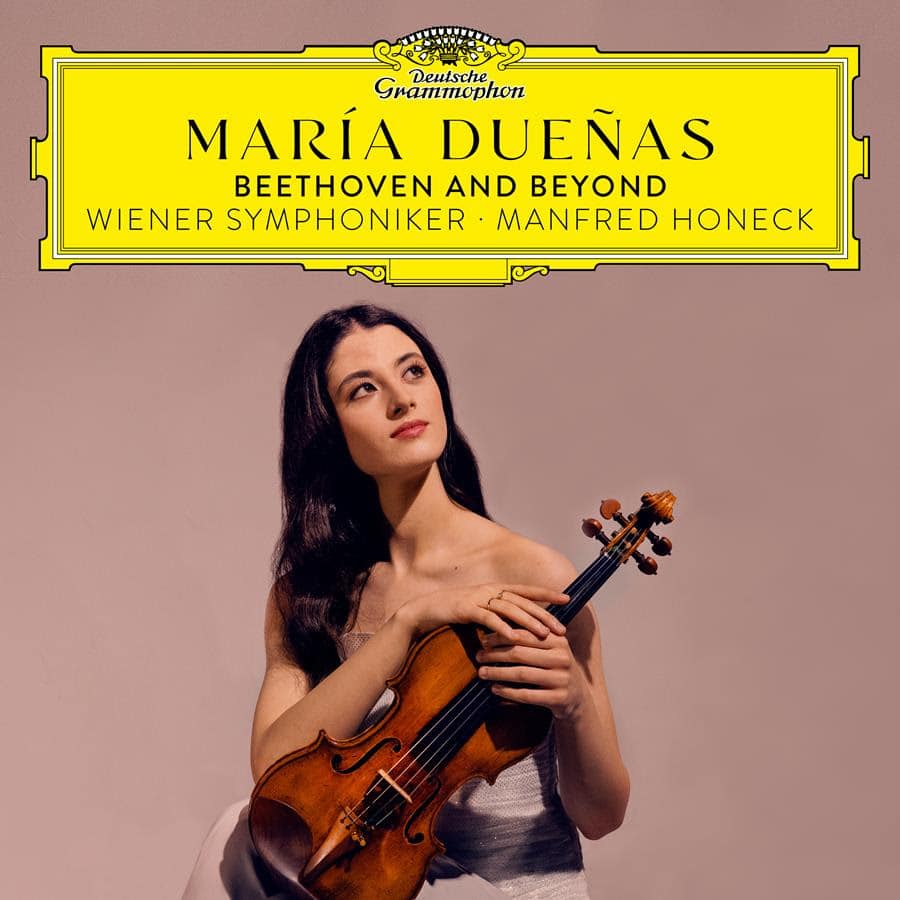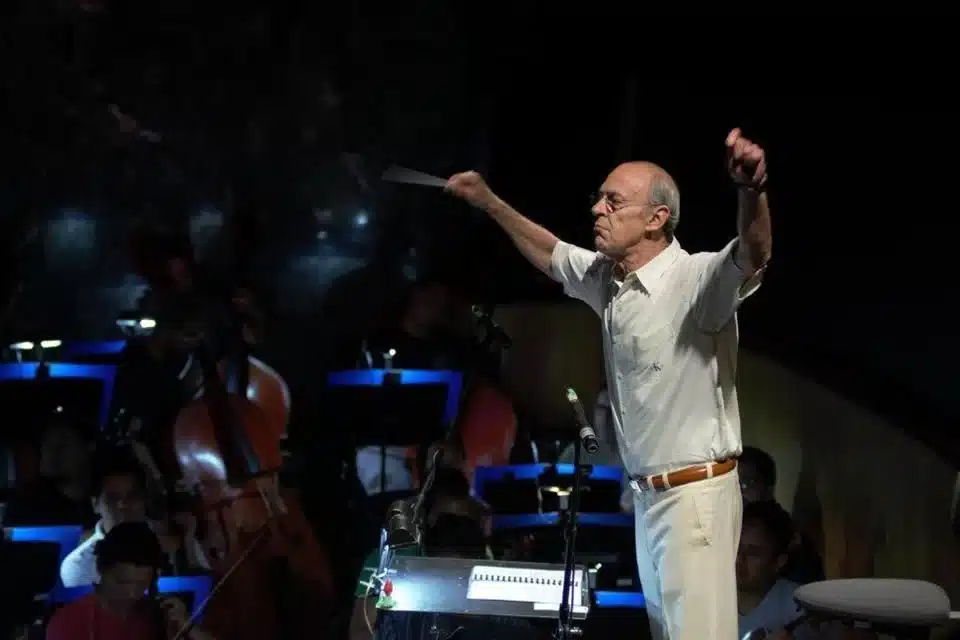All the Beethoven cadenzas, except the best
Why BeethovenThe Spanish violinist Maria Duenas has just released an interesting DG recording of the Beethoven concerto with her own cadenzas.
She appends a second CD with cadenzas for the first movement by Kreisler (inevitably) as well as Beethoven’s pupil Louis Spohr, Eugène Ysaye, Camille Saint-Saens and Henryk Wieniawski.
But not the ones by Joseph Joachim, the violinist who established the work in world repertoire, or by Alfred Schnittke, the Russian modernist who took it places Beethoven never imagined.
Duenas is a fine performer but she has been pitifully ill-advised.
In other news, Duenas was just awarded the $20k Princess of Girona Arts and Letters Award in Spain.






few if any of the numerous violinists who recorded Joachim’s cadenzas wrote, let alone recorded, their own cadenzas.
Did she actually write it? Who knows, but at least there’s something original for once.
She is more than a fine player. She is an absolutely world-class violinist who deserves world-wide recognition. Her performance of the Paganini 4th Caprice is absolute perfection, delivered without a shred of hesitation, in what is one of the most difficult pieces in the repertoire. I doubt there are even 10 violinists on this planet who can measure up to it.
As far as the Beethoven Cadenza, I’m sure she’s aware of all of them and made the choice she felt was best. Frankly, these cadenzas are just a matter of tradition, and it’s refreshing to hear someone play her own as opposed to rehashing the same ones over and over. But what really matters is the way she plays the actual Concerto — with more warmth, personality, and musical intelligence that I’ve heard in probably decades.
And a matter of personal taste! Imagine someone asserting a soloist chose the wrong cadenza when the whole point is that it is their moment to assert their taste.
It’s often overlooked that Beethoven wrote an original cadenza for his piano transcription of this concerto! Back in the 80s, Joseph Swensen transcribed that cadenza (which even includes the tympani motif) back to solo violin and recorded it with Previn.
Wolfgang Schneiderhan did the same back in the 60s. I’m curious to hear Swensen’s recording to see how his transcription compares to Schneiderhan’s.
The Soviets published an entire book of cadenzas for the Beethoven Concerto, and there are more good ones than you’d think likely. Ruggiero Ricci’s Biddulph CD is the one to get if you have cadenza curiosity, but while he recorded many more than Duenas did, even he did not take on all of them. I’ll be interested in hearing Duenas’s own. Since neither Ricci nor Duenas makes any claim to being complete (and even that Soviet book is not complete) I don’t see how it is ill-advised for her to leave out the Joachim and Schnittke since there are already good ways to hear those should you want to.
This is by the way the second recent posting where our host refers to Spohr as Beethoven’s pupil. What is the evidence for this assertion? I am aware of none.
They knew each other. Spohr was an on-and-off admirer, mostly off. By the time Spohr came to live in Vienna (1812) both his violin style and his compositional manner were fully formed. Beethoven would come to visit and enjoyed playing with the Spohr childrenm but Spohr himself never showed any of his compositions to Beethoven because he was aware Beethoven took little interest in the compositions of others; years later Beethoven himself became aware of some of Spohr’s music but found it too chromatic for his taste (remember that Spohr managed to be anti-Beethoven but pro-Wagner). Spohr did conduct Beethoven’s music, but perhaps in the same spirit that Joseph Joachim conducted some of Wagner’s — he felt his audience needed to hear it to be an informed audience.
Spohr should be taken seriously in his own right, not just (wrongly) as a Beethoven appendage. His Nonet for wind and strings, for instance, is a fine and very influential work. He would have been enraged if anybody had called him Beethoven’s pupil.
I don’t think Spohr was ever Beethoven’s pupil. He heard Beethoven play in the Archduke Trio and thought Beethoven’s style unnecessarily percussive.
Not surprisingly, after Beethoven most composers wrote their own cadenzas (often in collaboration with a violin colleague). Nothing worse than listening to Mozart, or Beethoven then having to tolerate a second- or third-rate attempt at writing a cadenza that too often goes on and on and on. Mendelssohn, Brahms, and Sibelius learned the lesson.
In Brahms’ case, I personally have never heard of the existence of his own cadenza for the first movement of his violin concerto, but he did indeed write his own cadenzas for all three of his other concertos – both of those for the piano as well as for the violin/cello double. And Mendelssohn wasn’t the first: for example, Mozart’s violin/viola double concerto a.k.a. Sinfonia Concertante is always performed with the composer’s own cadenzas too.
I heard Gidon Kremer perform the Brahms with a cadenza by Schnittke. It was quite a shock when used to the Joachim – and quite jarring on the ear I felt.
I believe that you are referring to Kremer’s Beethoven concerto recording with Marriner on which he plays the Schnittke cadenzas. His Brahms concerto recording with Bernstein has a Prelude by Max Reger as cadenza.I don’t think Schnittke wrote one for the Brahms.
Maybe she’ll release the missing cadenzas on YouTube as loss leaders for the CD!
I’ll be honest – I barely know the difference between a cadenza and a credenza. I’m just glad someone’s still issuing recordings of “serious” music.
isn’t there an Auer?
Yes the Auer cadenzas (we really should be using the plural since all three movements of the Beethoven call for a cadenza) are published in the Carl Fischer edition of the Concerto., which is the one I learned the Concerto from. They are difficult! You can hear them on Jascha Heifetz’s 78 rpm recording with Toscanini. Heifetz makes a few modest changes to the Auer urtext.
Harry Collier (above) mentions composers writing their own cadenzas, and has been mentioned by others, Beethoven wrote his own cadenzas for the piano concerto version of the violin concerto, complete with part for tympani. Schneiderhan memorably recorded it in a version for solo violin but so have others; Swensen is mentioned, and Ricci included it. And of course, those who have recorded the piano version of the violin concerto have recorded it. But apart from the novelty of hearing a tympani part in a cadenza, and apart from Schneiderhan’s wonderful fiddle playing, the Beethoven-composed cadenzas really don’t seem all that interesting purely as composed music. Busoni took up the idea of including a part for tympani, and HIS cadenzas for the Beethoven Concerto (recorded by Szigeti in his last – stereo – recording) are in my opinion more intrinsically interesting than the composer’s own. Heh — I wonder, has anyone ever reversed transcribed Busoni’s violin cadenzas backwards for the piano version of the violin concerto?
And to belabor the point, Aram Khachaturian wrote very nice cadenzas for his Violin Concerto (there are two in the first movement!), memorably recorded by Leonid Kogan with the Boston Symphony, but David Oistrakh wrote his own and most performers seem to vote for Oistrakh. Khachaturian conducts on Oistrakh’s stereo recording so cannot have been offended. Khachaturian had the lovely idea of having the clarinet share part of one cadenza with the soloist.
Gidon Kremer has recorded it with Schnittke’s cadenza.
If British: “exciting”, “intriguing”, “interesting”, “refined”, always give the benefit of the doubt
If not British, its never good. If good its never the best. If the best, never genius. If genius, never British..
Nothing new in this blog…